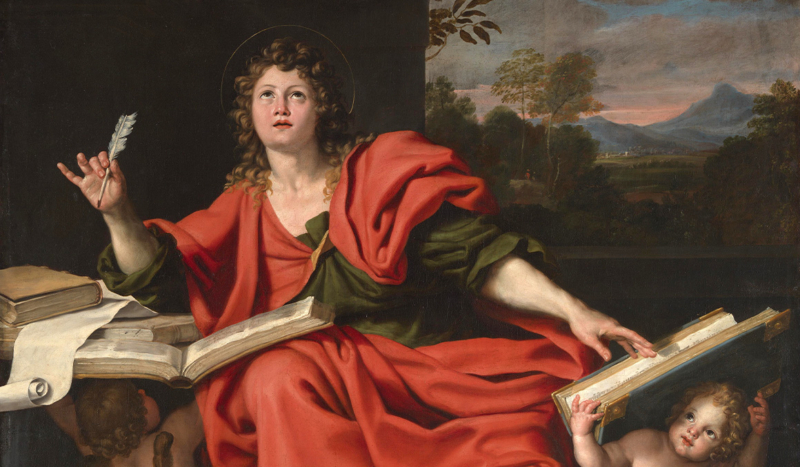
St John the Evangelist / Domenico Zampieri
CV NEWS FEED // The third day of Christmas, December 27, is dedicated to St. John the Apostle, also known as St. John the Beloved. The feast day honors his profound love for Christ, demonstrated at the Last Supper when he leaned on Christ’s heart, and his devotion as the only apostle to remain at the foot of the Cross.
St. John holds a special place in Catholic tradition. As the youngest apostle and a mark of special friendship with Our Lord, he is referred to as “the disciple whom Jesus loved.” After the Resurrection, John cared for the Blessed Virgin Mary and later settled in Ephesus, where he wrote his Gospel and Epistles. He also authored the Book of Revelation during his exile on Patmos. Unlike the other apostles, John did not die a martyr but lived to an old age, passing away naturally in Ephesus around 100 AD.
The Eastern Catholic and Orthodox Churches commemorate St. John’s “Repose” Sept. 26 and his “Feast” on May 8, celebrating miraculous healings attributed to fine ashes from his grave. Western traditions include the Dec. 27 feast to emphasize St. John’s closeness to Christ and his role as a theologian of divine love.
Medieval Catholics celebrated St. John’s feast with the blessing of wine, known as the “Love of St. John,” inspired by his participation in the Last Supper and a miracle attributed to him, in which he drank poisoned wine unharmed.
This blessing not only commemorates the chalice of the Last Supper but also the miraculous event described in the Golden Legend. When Aristodemus, a pagan priest, offered St. John a cup of poisoned wine to prove the power of Christ, John blessed the cup, and the poison emerged in the form of a serpent. He drank the wine unharmed, converting Aristodemus and many witnesses to Christianity.
The prayer for blessing the wine, preserved in the old Roman Ritual, reads as follows:
Bless and consecrate, O Lord God, this chalice of wine through the merits of St. John, Apostle and Evangelist. Bestow benediction and protection upon all who drink of this cup. For as the Blessed John partook of the poisoned potion without any hurt, so may all who on this day drink of the blessed wine to the honor of St. John, by him be freed from poisoning and similar harmful things. And as they offer themselves soul and body to thee, O Lord God, give them absolution and pardon. Through Christ our Lord. Amen.
In many regions, families brought their finest wine to be blessed in church. The “Love of St. John” wine, or Johannesminne, was shared among household members during a solemn meal. Each family member passed the blessed wine with the words: “I drink to the love of St. John,” to which the recipient replied, “I thank you for the love of St. John.”
The wine held a special place throughout the year. A drop of it was added to wine barrels to prevent spoilage, and sips were taken on significant occasions such as weddings, long journeys, or during illness. It was even given to the dying after receiving the last sacraments, providing strength and consolation in their final moments. The blessing of St. John’s wine reflects the enduring Catholic veneration for the apostle of divine love.
The Prologue of the Gospel of John, in which he famously writes, “The Word was made flesh, and dwelt among us, full of grace and truth” (John 1:14), marks the Gospel for the Day Mass of Christmas and is the Last Gospel in every Traditional Latin Mass.
St. John’s feast, embedded within the Christmas octave, highlights the joy of the season. By honoring him, Catholics celebrate the light of Christ, which St. John so eloquently proclaimed: “The true light, which enlighteneth every man that cometh into this world” (John 1:9).

